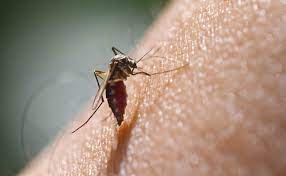GENEVA (AFP): Climate change is making the fight against malaria even harder, with the campaign already struggling to make up ground lost during the Covid-19 pandemic, the World Health Organization warned Thursday.
“The changing climate poses a substantial risk to progress against malaria, particularly in vulnerable regions,” WHO chief Tedros Adhanom Ghebreyesus said as the WHO published its World Malaria Report.
Changes in temperature, humidity and rainfall influence the behaviour and survival of mosquitos that carry the disease, with extreme weather events such as heatwaves and flooding also driving up cases, the UN health agency said.
There were 249 million recorded malaria cases and 608,000 deaths in 2022, both up from before Covid.
“Sustainable and resilient malaria responses are needed now more than ever, coupled with urgent actions to slow the pace of global warming and reduce its effects,” Ghebreyesus said.
The WHO said ideal mosquito breeding and survival occurs at temperatures ranging from 20 to 27 degrees Celsius.
“A slight warming in cooler, malaria-free zones could lead to new malaria cases,” it said.
And population displacement due to climate changes may also lead to increased malaria as individuals without immunity migrate to endemic areas.
Extreme weather events such as the floods that hit Pakistan in 2022 can lead to large epidemics.
As a slight counterweight, increased aridity could eliminate malaria from some currently-endemic zones.
But WHO warned that “overall” climate change hampers anti-malaria efforts.
“We are sounding the alarm so that everyone realises that it is time to stop this increase in temperatures,” Daniel Ngamije, director of the WHO’s global malaria programme, told AFP.
– Pandemic setback –
As it confronts climate change, the global fight against malaria is still reeling from the impact of Covid-19.
“In terms of both malaria cases and deaths, the world is worse off now than before the pandemic,” the WHO said, citing disruption to malaria services during the Covid crisis.
Malaria-endemic countries have managed to stabilise those rates, but at very high levels, the organisation said.
Furthermore, it added: “The impacts of extreme weather events, conflict and humanitarian crisis, resource constraints, biological threats, and inequities have impeded recovery.”
Ngamije said progress against malaria has broadly stagnated for five years.
However, he said, “there is good news, particularly in terms of the introduction of new malaria prevention tools — notably the new classes of mosquito nets impregnated with insecticide… but above all the introduction of a second vaccine against malaria.”
– Cases and deaths –
Malaria cases fell from 243 million in 2000 to 233 million in 2019 — the last year before the Covid pandemic exploded.
They soared in 2020, flatlined in 2021 and went up again by five million last year to 249 million.
The WHO said those five million additional cases were mainly concentrated in five countries.
Due to devastating floods last year, Pakistan saw 2.1 million more cases — a five-fold increase — followed by Ethiopia and Nigeria with 1.3 million each. Next came Uganda, up by 597,000, and Papua New Guinea, up 423,000.
The 608,000 global malaria deaths in 2022 was also higher than the pre-pandemic figure of 576,000.
– Vaccine hopes –
Humanitarian crises, and biological threats such as drug and insecticide resistance, can also drive up malaria cases.
The WHO said partial resistance to artemisinin — the core compound in the frontline ACT drug combination used to treat malaria — “is a growing concern”.
Nonetheless, it has high hopes for the roll-out in Africa of RTS,S, the world’s first malaria vaccine, following a successful pilot.
The WHO also gave its stamp of approval to a second malaria vaccine, R21, in October.
Total spending on malaria reached $4.1 billion in 2022.
This is “well below the $7.8 billion required globally” to reach the target of cutting cases and mortality by 90 percent between 2015 and 2030, the WHO said.
“A substantial pivot is needed to get back on track with much greater financing, better tools, data-driven strategies and robust political commitment.”







